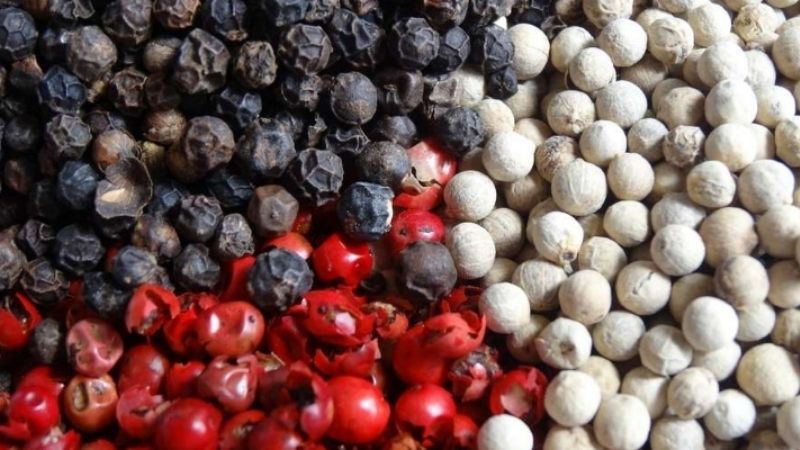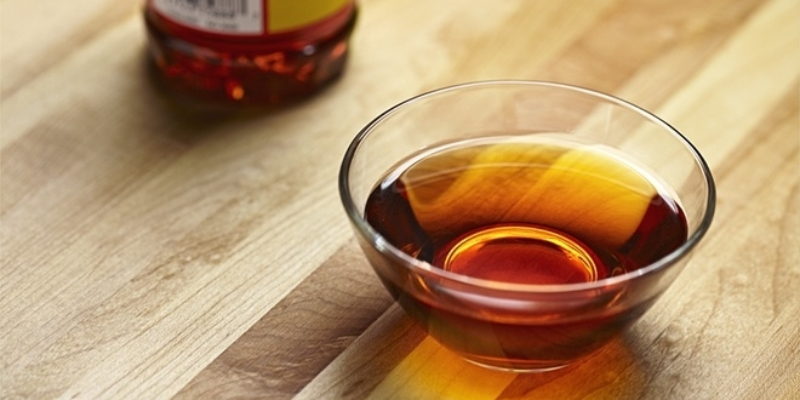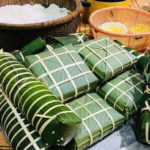1 Pepper
Pepper has a spicy, pungent flavor and a distinctive aroma, often used for marinating food. There are many types of pepper available in the market, such as black pepper, peppercorns, green, and red peppers, classified based on color and the intensity of their flavor.
Many people add pepper at the beginning of the marination process, believing that a longer duration enhances the flavor of the dish. However, the opposite is true. Pepper, when cooked for extended periods at high temperatures, loses its unique flavor and can also produce toxic compounds, increasing the risk of cancer. Additionally, excessive use of pepper in marination and cooking can cause heat shock in the body, leading to fatal consequences.
Solutions:
+ Add pepper only after completing the marination process.
+ Adjust the amount of pepper according to the dish. As a rule of thumb, use approximately one-third of a teaspoon of pepper per bowl of soup for four people.
+ It is best to roast the peppercorns beforehand and keep them whole. Grind the pepper just before use to retain its flavor and aroma.
 Using pepper in cooking
Using pepper in cooking
2 Sugar
There are various types of sugar, such as palm sugar, brown sugar, black sugar, and caster sugar. Sugar not only adds sweetness and balances flavors but also helps caramelize and color your dishes.
The common practice of adding sugar at the beginning of the cooking process, especially when marinating, can lead to burnt and bitter-tasting food. This burnt layer of sugar is one of the causes of cancer.
Solutions:
+ If you want to use sugar for marination, add it before seasoning with salt. This prevents sugar from coming into direct contact with high temperatures and burning.
+ For fried and grilled dishes, consider using honey instead of sugar, or add sugar towards the end of the cooking process to balance the flavors.
+ Maintain a moderate temperature and cook for a shorter duration. The ideal temperature range is between 170°C and 200°C (338°F and 392°F).
+ If you consume a lot of sugar regularly, consider using diet or low-calorie sweeteners as a healthier alternative.

3 Fish Sauce
Fish sauce is a flavorful condiment rich in protein, vitamins A, D, and B1, and amino acids. It is an essential ingredient in Vietnamese cuisine, used both in cooking and as a dipping sauce.
Many homemakers use fish sauce in dishes that require long cooking times, such as stews and braises. However, when exposed to high temperatures for extended periods, the beneficial amino acids break down, and the sauce may develop a bitter taste, becoming a potential cause of food poisoning.
Solutions:
+ Use fish sauce only in dishes that require short cooking times.
+ For soups, stews, and hot pots, add fish sauce just before turning off the heat.
+ For long-simmered stews, season the dish with fish sauce towards the end of the cooking process and simmer for an additional 1-2 minutes over low heat.

Pepper, sugar, and fish sauce are beneficial when used correctly and in moderation. By learning about these common mistakes and making the necessary adjustments, you can improve your cooking skills and enhance the flavor and safety of your dishes.
8 Common Mistakes People Make with Cutting Boards
Are you using your cutting board correctly? Many Vietnamese households rely on cutting boards in their kitchen, but not everyone knows how to use them properly, especially when it comes to wooden cutting boards. Check out these 8 mistakes to avoid when using a cutting board to ensure both hygiene and safety for everyone in your family.
Is Refrigerated Leftovers Linked to an Increased Risk of Cancer?
Dr. Lam Van Man, Head of Research, Development and Technology Transfer Department of the Institute of Safety Food, has warned of the risk of food poisoning when reheating leftovers from the refrigerator. But what should we be aware of when it comes to the possibility of these leftovers causing cancer? Here, we explore what the experts have to say on the matter and offer some tips for safe eating.
Preserving Leftover Food from the Tet Holiday
With the beginning of the Lunar New Year, many households are stocking up on food to celebrate the festive occasion. While keeping food in the refrigerator is convenient, it can also be harmful to users if not done correctly. We have compiled a few tips to help ensure food remains fresh and safe to consume during Tet.



































